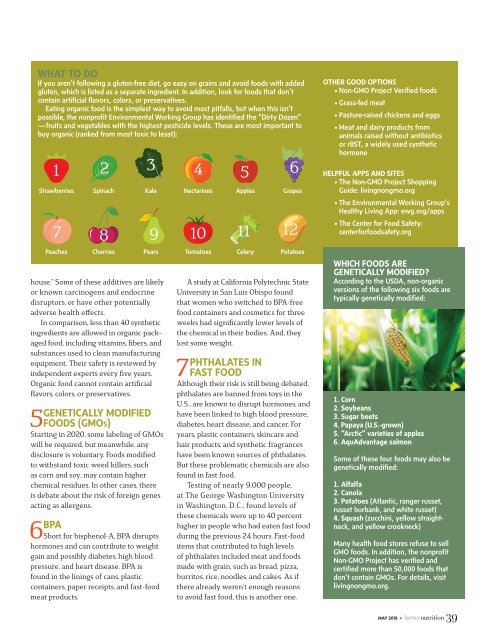Better Nutrition May 2019
You also want an ePaper? Increase the reach of your titles
YUMPU automatically turns print PDFs into web optimized ePapers that Google loves.
WHAT TO DO<br />
If you aren’t following a gluten-free diet, go easy on grains and avoid foods with added<br />
gluten, which is listed as a separate ingredient. In addition, look for foods that don’t<br />
contain artificial flavors, colors, or preservatives.<br />
Eating organic food is the simplest way to avoid most pitfalls, but when this isn’t<br />
possible, the nonprofit Environmental Working Group has identified the “Dirty Dozen”<br />
—fruits and vegetables with the highest pesticide levels. These are most important to<br />
buy organic (ranked from most toxic to least):<br />
1<br />
Strawberries<br />
7<br />
Peaches<br />
2<br />
Spinach<br />
8<br />
Cherries<br />
3<br />
Kale<br />
9<br />
Pears<br />
house.” Some of these additives are likely<br />
or known carcinogens and endocrine<br />
disruptors, or have other potentially<br />
adverse health effects.<br />
In comparison, less than 40 synthetic<br />
ingredients are allowed in organic packaged<br />
food, including vitamins, fibers, and<br />
substances used to clean manufacturing<br />
equipment. Their safety is reviewed by<br />
independent experts every five years.<br />
Organic food cannot contain artificial<br />
flavors, colors, or preservatives.<br />
5GENETICALLY MODIFIED<br />
FOODS (GMOS)<br />
Starting in 2020, some labeling of GMOs<br />
will be required, but meanwhile, any<br />
disclosure is voluntary. Foods modified<br />
to withstand toxic weed killers, such<br />
as corn and soy, may contain higher<br />
chemical residues. In other cases, there<br />
is debate about the risk of foreign genes<br />
acting as allergens.<br />
6BPA<br />
Short for bisphenol-A, BPA disrupts<br />
hormones and can contribute to weight<br />
gain and possibly diabetes, high blood<br />
pressure, and heart disease. BPA is<br />
found in the linings of cans, plastic<br />
containers, paper receipts, and fast-food<br />
meat products.<br />
4<br />
Nectarines<br />
10<br />
Tomatoes<br />
5<br />
Apples<br />
11<br />
Celery<br />
6<br />
Grapes<br />
12<br />
Potatoes<br />
A study at California Polytechnic State<br />
University in San Luis Obispo found<br />
that women who switched to BPA-free<br />
food containers and cosmetics for three<br />
weeks had significantly lower levels of<br />
the chemical in their bodies. And, they<br />
lost some weight.<br />
7PHTHALATES IN<br />
FAST FOOD<br />
Although their risk is still being debated,<br />
phthalates are banned from toys in the<br />
U.S., are known to disrupt hormones, and<br />
have been linked to high blood pressure,<br />
diabetes, heart disease, and cancer. For<br />
years, plastic containers, skincare and<br />
hair products, and synthetic fragrances<br />
have been known sources of phthalates.<br />
But these problematic chemicals are also<br />
found in fast food.<br />
Testing of nearly 9,000 people,<br />
at The George Washington University<br />
in Washington, D.C., found levels of<br />
these chemicals were up to 40 percent<br />
higher in people who had eaten fast food<br />
during the previous 24 hours. Fast-food<br />
items that contributed to high levels<br />
of phthalates included meat and foods<br />
made with grain, such as bread, pizza,<br />
burritos, rice, noodles, and cakes. As if<br />
there already weren’t enough reasons<br />
to avoid fast food, this is another one.<br />
OTHER GOOD OPTIONS<br />
• Non-GMO Project Verified foods<br />
• Grass-fed meat<br />
• Pasture-raised chickens and eggs<br />
• Meat and dairy products from<br />
animals raised without antibiotics<br />
or rBST, a widely used synthetic<br />
hormone<br />
HELPFUL APPS AND SITES<br />
• The Non-GMO Project Shopping<br />
Guide: livingnongmo.org<br />
• The Environmental Working Group’s<br />
Healthy Living App: ewg.org/apps<br />
• The Center for Food Safety:<br />
centerforfoodsafety.org<br />
WHICH FOODS ARE<br />
GENETICALLY MODIFIED?<br />
According to the USDA, non-organic<br />
versions of the following six foods are<br />
typically genetically modified:<br />
1. Corn<br />
2. Soybeans<br />
3. Sugar beets<br />
4. Papaya (U.S.-grown)<br />
5. “Arctic” varieties of apples<br />
6. AquAdvantage salmon<br />
Some of these four foods may also be<br />
genetically modified:<br />
1. Alfalfa<br />
2. Canola<br />
3. Potatoes (Atlantic, ranger russet,<br />
russet burbank, and white russet)<br />
4. Squash (zucchini, yellow straightneck,<br />
and yellow crookneck)<br />
Many health food stores refuse to sell<br />
GMO foods. In addition, the nonprofit<br />
Non-GMO Project has verified and<br />
certified more than 50,000 foods that<br />
don’t contain GMOs. For details, visit<br />
livingnongmo.org.<br />
MAY <strong>2019</strong> • 39

















